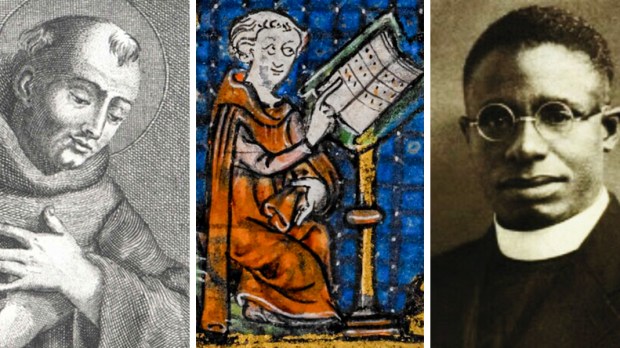For over a month, American Catholics have been unable to attend Mass; in other parts of the world, it’s been longer. And while we may find ourselves envying the priests who we see receiving the Eucharist as they livestream the Mass, it’s important for the laity to remember that our priests hate this. They didn’t sign up to be hermits and they don’t want to serve only by offering the Holy Sacrifice of the Mass on their own. They want to be giving us the Eucharist, hearing confessions, baptizing babies and heading to the reception afterward.
And so this week, I have some saints for the priests among us.
Dear Fathers, thank you for your obedience, your faithfulness, your creativity in ministry, and your spiritual fatherhood. I offer you these intercessors, saintly priests who were separated from their people, unable to serve in the ways they had expected. May their witness of holiness encourage you and their intercession build you up so that this time of exile from your people might be an opportunity for boundless grace.
Bl. Cyprian Michael Iwene Tansi (1903-1963) was a parish priest in Nigeria. He helped his people build houses, rode his bike from one village to another, heard confessions for hours on end, defended the rights of women, and brought many souls to Jesus. He was such a good witness, 70 men from his parishes went on to become priests. But Fr. Tansi felt a call to monastic life, so he left his parish to become a Trappist in England, hopeful that he would one day be able to return to Africa. The pastor whose ministry had borne so much fruit was suddenly a novice, asked to do nothing but learn, and prohibited even from hearing confessions. For years, he was unable to exercise any ministry at all, and though he was ultimately allowed to hear confessions again, he died before ever being able to return to Africa.
St. Pacificus of San Severino (1653-1721) was a Franciscan priest, a brilliant preacher who wandered the countryside preaching until he developed sores on his feet that made walking nearly impossible. So he retreated to the confessional, where he was glad to be able to serve his people still by hearing confessions for six hours a day—until he lost his hearing. After that, he contented himself with celebrating Mass, until his sight went as well. By all worldly measures, Pacificus was useless. He spent the next 30 years in pain and isolation, but by prayer and leadership in his community, he continued to serve his people even though he could no longer offer them the Sacraments.
Bl. Peter Kibe (1587-1639) was a Japanese Christian who was denied admission to the Society of Jesus multiple times because of his race. He ultimately went to Rome in order to become a Jesuit priest, then spent eight years traveling in order to return to Japan. He was rerouted by storms, chased by pirates, and refused passage on ships bound for Japan before he finally built his own ship to sail the last leg of his journey. Even shipwreck couldn’t stop this priest who longed to be with his people. He finally made it to Japan, where he served the Hidden Christians of Japan for nine years before being betrayed and martyred.
St. John Roberts (1577-1610) was a Welsh convert and undercover Benedictine priest in England who never gave up on his people. Arrested as a priest, he was exiled from England but returned to serve plague victims. Arrested a second time, he was once again banished, but returned to England almost immediately to serve once more as an undercover priest. The third time he was arrested, he was imprisoned for seven months before being sent into exile once again—and returning. Arrested again, he escaped from prison and returned to ministry. Arrested a fifth time, he was banished again but sneaked back into the country. Roberts was arrested for a sixth time (in eight years) and finally martyred, a priest who loved his people to the end.
St. Theophilus the Penitent (d. 538) is not one to be imitated—at least not in his initial response to adversity. Archdeacon of Adana, Turkey, he was chosen bishop but refused out of humility. Unfortunately, his humility wasn’t strong enough to endure slander. When he was accused of theft and removed from ministry, Theophilus was so desperate to be vindicated, he sought out a necromancer to help him make a deal with the devil, renouncing Jesus and selling his soul through a contract signed with blood. An extreme reaction to being unable to serve as a priest, many might say, but the inclination to disobey and deceive one’s bishop isn’t as different as we might think. Mercifully, Theophilus had a well-formed conscience and soon repented, confessed publicly, and died three days later.

Read more:
Aid group commits $5.5M to support priests and nuns serving communities most vulnerable to COVID-19

